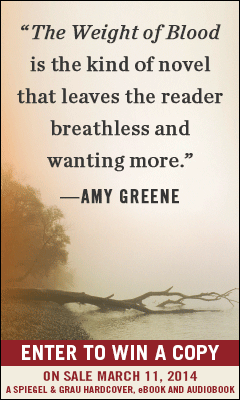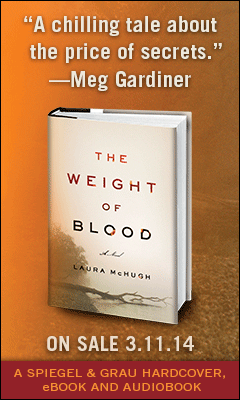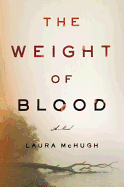The Weight of Blood
by Laura McHugh
"That Cheri Stoddard was found at all was the thing that set people on edge, even more so than the condition of her body." So opens Laura McHugh's delightfully and darkly disturbing debut novel, The Weight of Blood. The town of Henbane is agitated because it is so good at keepings its secrets--and bodies are so easy to hide in the twisted, wooded Ozark Mountains.
The story begins with the first-person perspective of 18-year-old Lucy Dane. Lucy has it pretty good: she has a reliable best friend, a loving relationship with her father, and neighbors who make up an extended family of sorts. And she's just begun working in her uncle's store, where she gets to rub elbows with the sexy Daniel. But Lucy is troubled by the disappearance of her sort-of friend Cheri, a developmentally disabled schoolmate whose freshly dead body was only recently discovered--a year after she went missing. She's also still troubled by the unexplained disappearance of her mother, Lila, who walked out of the house carrying a handgun and nothing else when Lucy was a year old.
The perspective then shifts to that of Lila herself as a young woman, newcomer to the Danes' hometown of Henbane. Henbane is almost a character unto itself, insular, suspicious and largely unmarked by passing time. For a fee, residents can avoid a "city burial" (embalmment and the involvement of the authorities) in favor of a private grave-digging service. And the local lawyer will advise you not to trust local police until you find out who's related to whom. It is anything but a friendly destination for a damaged teenager like Lila, who immediately runs up against the Dane brothers: the older Crete, who runs several businesses including a farm and a store, and his little brother, Carl, who becomes her husband before she turns 19. Superstitions have her labeled a witch before she's unpacked her few belongings.
Through Lila's eyes, the reader will find out slightly more about her background than Lucy knows, but Lila works hard to remain a mystery to both the reader and Henbane locals, including Carl. The perspectives continue to alternate. While Lucy keeps the reader up to date on current goings-on, it is through Lila that we begin to learn the ugly secrets that Henbane keeps. Other characters, too, get occasional chapters told from their point of view (in omniscient third person; only Lila and Lucy get first-person treatment), and one of the strengths of The Weight of Blood is that its engaging, complex, fully wrought characters extend beyond its protagonists. Lucy's best friend, Bess, and Bess's mother, Gabby (who was, in turn, best friend to Lila); Carl and Crete; the love interest, Daniel; a surrogate grandmother; and a local drug dealer all get sensitive handling and character development. But it is the measured building of tension and the careful doling out of hints of evil that star, as Lucy's coming-of-age experience brings the classic bildungsroman to meet the gritty thriller.
While helping Daniel clean out an old trailer belonging to her uncle, Lucy discovers a clue: a lost item that she knows used to belong to Cheri, because Lucy gave it to her. Next, Bess overhears a reference that she shouldn't have. With Daniel's cautious support, Lucy begins to look into Cheri's death, and the matter of where she spent that unaccounted-for year. But, of course, in a town this small, where everyone recognizes headlights and knows where a particular truck might be heading, investigations are dangerous. Like her mother before her, Lucy is told outright that it would be risky to go to the police for help. And as she probes the question of Cheri's fate, and finds it apparently linked to her mother's, Lucy will be disturbed at how close her inquiries lead her to home.
Carl and Crete, the Dane brothers, are heir not only to the off-the-books grave-digging business, the combined local grocery store and restaurant, and various secrets, but also to mental illness and corruption. As its title suggests, The Weight of Blood is concerned with the strength of our bonds to our family, and the tension between biological ties of blood and the families we choose for ourselves. In a remarkably convincing portrayal of young adulthood, Lucy allows McHugh to explore themes of loyalty: where it's owed, and to what extremes.
The atmosphere McHugh evokes in this masterful debut is wonderfully spooky, exemplifying Southern noir with a backwoods mountain twist and a matter-of-fact willingness to bury its dead out back and walk away. Taut pacing, lively suspense and atmosphere are the strongest points of a novel that also has an engaging plot and beautifully built, sympathetic characters to its credit. For fans of dark, suspenseful, well-structured thrillers, The Weight of Blood is a delicious and nail-biting treat. --Julia Jenkins








 Laura McHugh grew up in small towns in Iowa and the Ozark mountains of southern Missouri. She now lives in Columbia, Missouri, with her husband, two young daughters and one enormous dog. Her background includes computer science, software development and library science; The Weight of Blood is her first novel.
Laura McHugh grew up in small towns in Iowa and the Ozark mountains of southern Missouri. She now lives in Columbia, Missouri, with her husband, two young daughters and one enormous dog. Her background includes computer science, software development and library science; The Weight of Blood is her first novel.